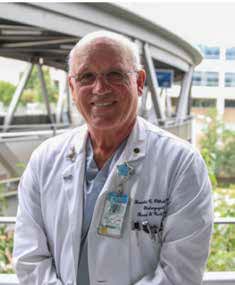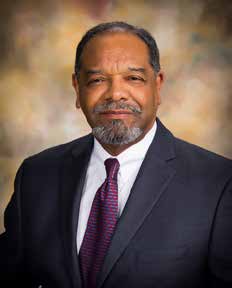 Despite what the American Medical Association has called an epidemic of physician burnout, some otolaryngologists aren’t emotionally or intellectually ready to retire at age 65, or even when it’s time for them to stop performing surgery. It can be incredibly difficult to make a decision about your future, regardless of whether that future is imminent or not.
Despite what the American Medical Association has called an epidemic of physician burnout, some otolaryngologists aren’t emotionally or intellectually ready to retire at age 65, or even when it’s time for them to stop performing surgery. It can be incredibly difficult to make a decision about your future, regardless of whether that future is imminent or not.
Explore This Issue
December 2023ENTtoday spoke to several otolaryngologists who have pivoted away from surgery and are still working in their 70s, many of whom are planning their next gig. Even if you aren’t nearing retirement, it’s never too early to start thinking about what your own future might look like. For many of these otolaryngologists, retirement didn’t always mean leaving medicine, and it ended up being very different from what they had imagined.
ADMINISTRATOR
Myles Pensak, MD, professor, consultant
At age 71, Myles Pensak, MD, hasn’t performed surgery since a spinal cord injury in 2016 impacted his ability to operate. But that didn’t stop him from working. “I had a fairly large administrative portfolio,” he said, “which was not impacted by my inability to operate.”
At the time of his injury, Dr. Pensak was serving as a department chair at the University of Cincinnati College of Medicine, in Ohio, as CEO of the physician practice plan at the university, as senior associate dean for clinical work, and as senior vice president for clinical work at the university’s health system.
Define yourself by the things you value and the things you add to other people’s lives. Don’t define yourself by your work title. — Myles Pensak, MD
Ironically, Dr. Pensak’s injury occurred while he was performing surgery to remove an acoustic neuroma. During the operation, he lost sensation and function in his right hand. “As my partner finished the case, a neurosurgeon walked into our little room outside of the O.R. and I was hyper spastic,” he said. “The next thing I knew I was having a spinal MRI, which showed that my spinal cord had become tethered and my spinal canal had narrowed down to 5 millimeters, at which point they said, ‘You need to do something now.’”
Just as quickly as that, Dr. Pensak was being opened from C-2 to C-5 for spinal surgery. “The only major advantage of having the surgery done, aside from my long-term health,” he joked, “is that it turned my absolutely horrible slice in golf into a magnificent fade because I don’t have full motion in my neck. Had I known, who knows, I might have had the surgery 30 years ago.”
Currently, Dr. Pensak is a professor emeritus of otolaryngology–head and neck surgery and neurological surgery at the University of Cincinnati College of Medicine, where he continues to teach and mentor residents. He’s also the executive vice president of the Triological Society, an appointment that will continue until 2025. Additionally, Dr. Pensak continued to see patients in clinic two and a half days per week until December 2023, when he decided to step away from all clinical work and heed his wife’s suggestion that they spend more time traveling together, which they both enjoy.
“She said to me, ‘Hey, we’re in our 70s, and we’ve got a finite amount of time to really go and do what we would like to do. And really, you can’t go if you have to be back in the office every Tuesday morning, and we can’t leave Cincinnati until Fridays because you’re seeing patients late in the day on Thursdays,’” he said.
Among their future adventures will be a six-to-eight-week trip to France, where Dr. Pensak, a Francophile, hopes to apply the French lessons he has been taking virtually and fully immerse himself in the language and culture to help him better read, write, and speak French. When he’s stateside, he hopes to find a pianist at the University of Cincinnati College’s Conservatory of Music to teach him how to play boogie-woogie, a type of music he has yet to learn in his 60 years of playing piano.
“I have too many friends for whom being the doctor or being the surgeon is how they view themselves,” he explained. “And I think that isn’t a long-term healthy strategy.”
His advice to colleagues contemplating retirement is pragmatic. “Define yourself by the things you value and the things you add to other people’s lives. Don’t define yourself by your work title.”
SURGICAL UTILIZATION REVIEW
Harold C. Pillsbury, III, MD: utilization reviewer, golfer
After more than 40 years of seeing patients in otolaryngology at the University of North Carolina School of Medicine and UNC Health in Chapel Hill, Harold C. Pillsbury, III, MD, has shifted gears in his career, embracing a new chapter of helping others.
Retiring from his jobs as surgeon, professor, otolaryngology division chief, and department chair, Dr. Pillsbury continues to use his expertise by doing utilization review for a third-party review company, Turning Point.
A couple of years ago, Dr. Pillsbury made a conscious decision to step back from operating, recognizing the potential complications associated with age. “I was 73 before I stopped doing surgery, and at that point, I felt that if I had a significant complication, people could legitimately question whether I was too old to be operating on patents, so I didn’t want to keep doing surgery,” he said. He also wanted to create space for younger, skilled surgeons to step into crucial roles.
In his new role, Dr. Pillsbury contributes to the decision-making process regarding proposed surgeries, providing insight into the necessity and advisability of procedures. As part of Turning Point, Dr. Pillsbury and his colleagues assess requests and ensure that there are comprehensive risk–benefit discussions done with patients. Most of the reviewers are nurses who give the proposed procedure either a thumbs up or thumbs down. If it’s the latter, Dr. Pillsbury looks it over.
Recently, Dr. Pillsbury had a case involving a cochlear implant for a patient who had been deaf for many years. The nurse reviewer initially turned down the procedure, stating the patient hadn’t tried a hearing aid for 30 days or more. After reviewing the case, Dr. Pillsbury noted that the hearing aids would be useless for the patient, and that the physician should proceed with implanting the device.
“I really like [doing reviews] and knowing that the patients are getting great care,” he said. “All patients deserve a robust discussion about the risks and benefits of surgical procedures.”
Although the financial compensation is minimal—about $40 per review—the satisfaction of knowing he plays a role in ensuring quality care keeps Dr. Pillsbury engaged in his new endeavor.
VETERANS AFFAIRS, POLITICS
Gregory A. Antoine, MD: chief of staff, dean
Otolaryngologist and plastic surgeon Gregory A. Antoine, MD, has been a trailblazer several times in his medical career and hopes to continue making a difference in a vastly different arena now that he’s no longer practicing medicine.
“I was the first African–American plastic surgeon to lead an academic plastic surgery division at a non-Historically Black Medical School in the United States,” he says of the 12 years that he spent as chief of plastic and reconstructive surgery at the Boston University School of Medicine.
He practiced actively until 2013 when he was 63 years old and performed his last surgery a couple of years later. Dr. Antoine then had the opportunity to pivot and become chief of staff at the Fayetteville, N.C.-based VA Medical Center, overseeing the care of more than 75,000 veterans.
A veteran of both the U.S. Navy and Army, Dr. Antoine is committed to helping veterans. He retired from the Army as a colonel and did his otolaryngology training at Walter Reed Army Medical Center in Bethesda, Md., before going on to complete a plastic surgery residency at Georgetown. His commitment to veteran healthcare was also evident in his efforts to address the opioid crisis during his time at the VA. “In my first three years, I reduced the opioid prescribing rate by 65%, the second highest in the nation,” he said.
In 2019, Dr. Antoine took on a new challenge as the chief medical officer and senior associate dean of clinical affairs at the Morehouse School of Medicine in Atlanta. And in 2021, frustrated with the state of political affairs in the United States, he made a bold move and ran for the United States Senate in North Carolina as a Democrat. (He lost). At the time of this writing, he was considering a run for President in 2024.
Although Dr. Antoine acknowledged that he might not win the Presidency, his primary goal is to spark dialogue around the country’s priorities and future direction. He has invested time in reading, understanding economics, and contemplating his next steps. “I don’t expect to win,” he said. “What I do expect, though, is to have some dialogue around what the nation’s priorities are and where this country is going.”
TELEMEDICINE/ALLERGY
Sigsbee Duck, MD: clinical director, aviator
Otolaryngologist Sigsby Duck, MD, enjoys practicing medicine so much that when he stopped performing surgeries in 2016, he transitioned to an allergy practice and now oversees the allergy clinic at the Specialty Clinics of Sweetwater Memorial Hospital in Rock Springs, Wy. Currently, his primary mode of practice is telemedicine.

